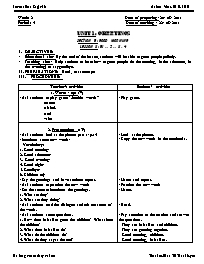Giáo án môn Tiếng Anh Lớp 6 - Unit 1: Greetings - Section B: Good morning - Lesson 3: B1, 2, 3, 4

2. Presentation: (13’)
- Ask students look at the picture part 1/ p.14
- Introduce some new words:
+ Vocabulary:
1. Good morning:
2. Good afternoon:
3. Good evening:
4. Good night:
5. Goodbye:
6. Children (n):
- Say the greetings and have students repeat.
- Ask students to practice the new words
- Set the scene to introduce the greetings.
1. Who are they?
2. What are they doing?
- Ask students read the dialogue and rub out some of the words.
- Ask students some questions.
1. How does Miss Hoa greet the children? What about the children?
2. What does Miss Hoa do?
3. What do the children do?
4. What do they say at the end?
Bạn đang xem tài liệu "Giáo án môn Tiếng Anh Lớp 6 - Unit 1: Greetings - Section B: Good morning - Lesson 3: B1, 2, 3, 4", để tải tài liệu gốc về máy bạn click vào nút DOWNLOAD ở trên
Week: 2 Date of preparing: 20/ 08/ 2011 Period: 4 Date of teaching: 22/ 08/ 2011 UNIT 1: GREETINGS Section B: Good morning Lesson 3: B1 – 2 – 3 - 4 OBJECTIVES: Educational aim: By the end of the lesson, students will be able to greet people politely. Teaching aims: Help students to learn how to greet people (in the morning, in the afternoon, in the evening) to say goodbye. PREPARATIONS: Book, cassette tape PROCEDURES: Teacher’s activities Students’ activities 1. Warm - up: (7’) - Ask students to play game “Jumble words” enam nhtask neif who 2. Presentation: (13’) - Ask students look at the picture part 1/ p.14 - Introduce some new words: + Vocabulary: 1. Good morning: 2. Good afternoon: 3. Good evening: 4. Good night: 5. Goodbye: 6. Children (n): - Say the greetings and have students repeat. - Ask students to practice the new words - Set the scene to introduce the greetings. 1. Who are they? 2. What are they doing? - Ask students read the dialogue and rub out some of the words. - Ask students some questions. 1. How does Miss Hoa greet the children? What about the children? 2. What does Miss Hoa do? 3. What do the children do? 4. What do they say at the end? - Give structure: + Good morning. + We’re fine. Thank you. + Goodbye / Bye. 3. Practice: (10’) - Ask students look at the pictures. - Let students identify the differences between the pictures. 1. When is the first / picture? 2. How can you greet people in the morning? - Ask them to practice in pairs and in groups. - Correct if there are any mistakes. + Good morning + Good afternoon + Good evening + Good night 4. Production: (10’) - Ask students look at part 4/ p. 16. - Ask students to work in pairs, complete the dialogue. - Call some pairs to practice in front of class. 5. Homework: (5’) - Ask students to learn how to greet people, say goodbye, numbers 11–15. - Prepare next lesson: Unit 1: C1-2/p.17 - Play game. - Look at the picture. - Copy the new words in the notebooks. - Listen and repeat. - Practice the new words - Listen. - Read. - Pay attention to the teacher and answer the questions. + They are Miss Hoa and children. + They are greeting together. + Good morning, children. + Good morning, Miss Hoa. + She is a teacher. + They are students. + Goodbye – Bye. - Listen and write. - Look at the pictures. - Answer the questions. In the morning/ afternoon Good morning - Practice greeting and saying goodbye in pairs then in groups. - Some students practice in front. - Look at part 4. - Pair works. - Practice. Take note. IV. COMMENTS: ---------------------------------------------------------------------------------------------------------------------------- --------------------------------------------------------------------------------------------------------------------------- _________________________________________b"&"a_______________________________
Tài liệu đính kèm:
 giao_an_mon_tieng_anh_lop_6_unit_1_greetings_section_b_good.doc
giao_an_mon_tieng_anh_lop_6_unit_1_greetings_section_b_good.doc





